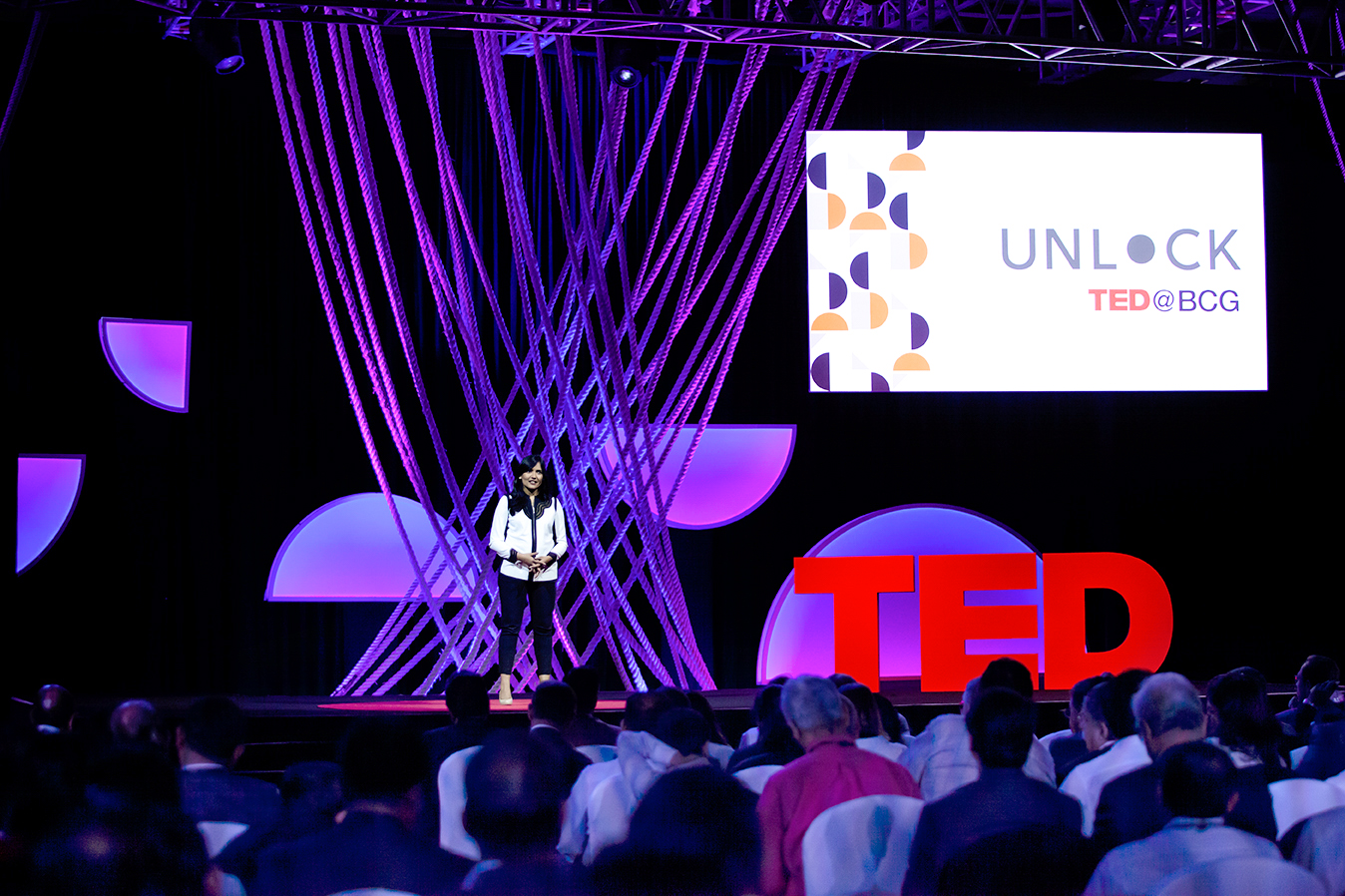
Seema Bansal hosts Session 2 of TED@BCG: Unlock — a day of talks and performances exploring how we can reach our full potential — at the Grand Hyatt Mumbai on September 24, 2019 in Mumbai, India. (Photo: Amit Madheshiya / TED)
To succeed in the next decade and beyond, we can’t just optimize what we know. We need to keep learning, imagining, inventing. In a day of talks and performances, 16 speakers and performers explored how we can unlock our full potential — human, technological and natural — to accomplish things we never thought possible.
The event: TED@BCG, the eighth time TED and BCG have partnered to bring leaders, innovators and changemakers to the stage to share ideas for solving society’s biggest challenges. Hosted by TED’s Corey Hajim and BCG’s Seema Bansal.
When and where: Tuesday, September 24, 2019, at the Grand Hyatt in Mumbai, India
Music: Performances by Gingger Shankar and Dee MC
Open and closing remarks: Rich Lesser, CEO of BCG
The talks in brief:
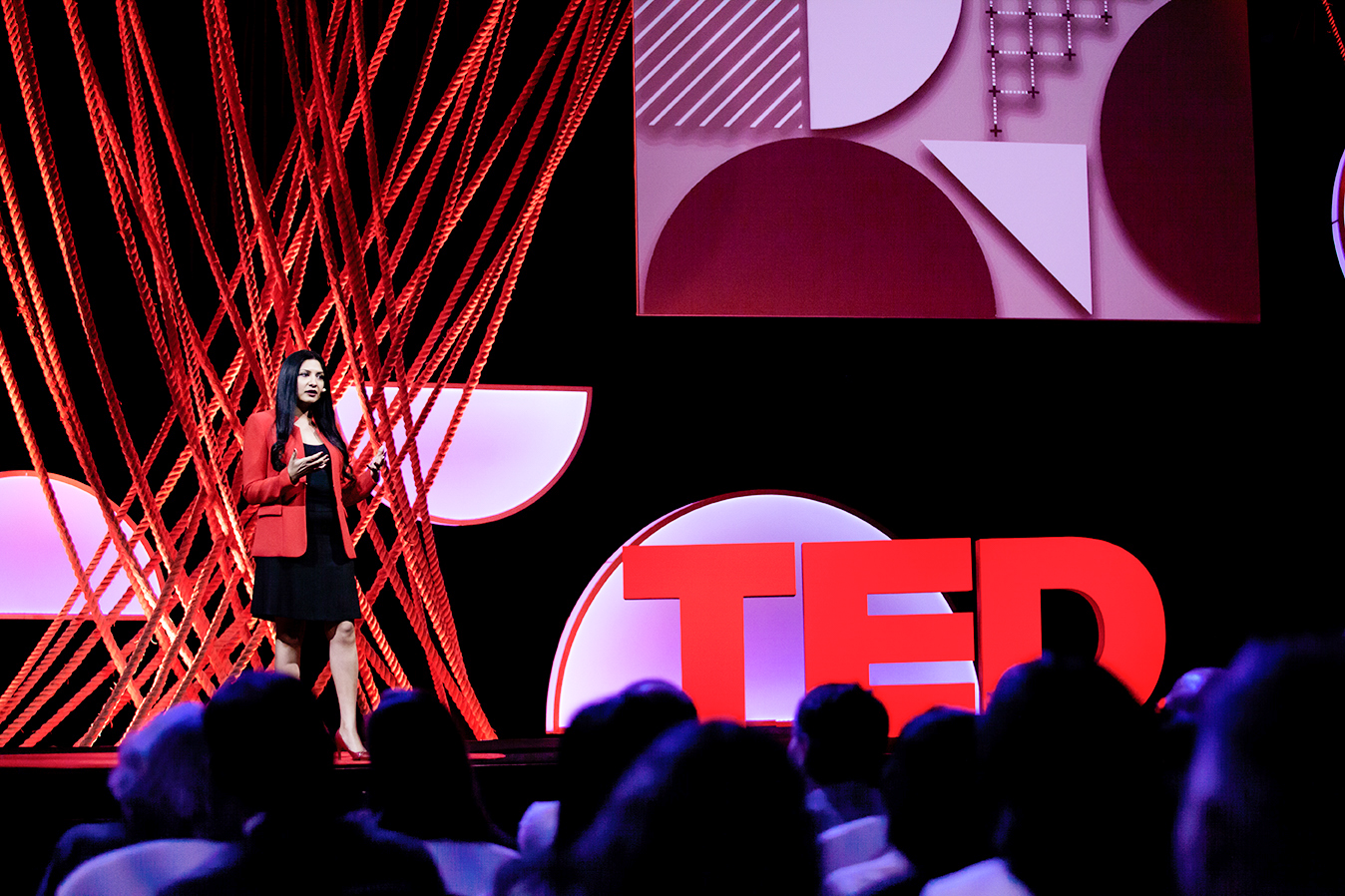
“Look around and find the people that inspire you to co-conspire. I promise you that your empathy and your courage will change someone’s life and may even change the world,” says Ipsita Dasgupta. She speaks at TED@BCG at the Grand Hyatt Mumbai on September 24, 2019 in Mumbai, India. (Photo: Amit Madheshiya / TED)
Ipsita Dasgupta, co-conspirator
Big idea: The world needs “co-conspirators”: people willing to bend or break the rules and challenge the status quo and societal norms.
Why? In the face of constant change and complexity, we need unconventional people making decisions at the table. These co-conspirators — which Dasgupta shares through three exemplary stories, including a mother insistent on forgoing some traditional gender roles — can help create new ways of thinking, acting and questioning why we do and how we do it.
Quote of the talk: “To achieve great heights or change the world, no matter how smart we are, we all need people.”
Jean-Manuel Izaret, pricing strategist
Big idea: Because of their huge per-patient cost, medications that could drastically reduce rates of deadly diseases like hepatitis C are often reserved for only the sickest patients, while many others go untreated. Is there a way to pay for these drugs so that every patient can get them, and drug companies can still finance their development?
How? The pricing model for pharmaceuticals is typically based on the cost per patient treated — and it’s a broken model, says Izaret. He explains that a subscription-like payment system (similar to the one pioneered by Netflix) could distribute costs over time and across an entire population of patient subscribers. By combining the savings of early treatment with the lower costs of a larger patient pool, healthcare providers could improve outcomes and remain profitable.
Quote of the talk: “I think we don’t really have a price point problem — I think we have a pricing model problem. I think the problem is not the number, but the unit by which we price.”
Sougwen Chung, artist and researcher
Big Idea: The future of creative collaboration between humans and machines is limitless — with beauty latent in our shared imperfections.
Why? As the world strives towards precision and perfection, Chung creates collaborative art with robots that explores what automation means for the future of human creativity. Through machine learning, Chung “taught” her own artistic style to her nonhuman collaborator, a robot called Drawing Operations Unit: Generation (DOUG). DOUG’s initial goal was to mimic her line as she drew, but they made an unexpected discovery along the way: robots make mistakes too. “Our imperfections became what was beautiful about the interaction,” Chung says. “Maybe part of the beauty of human and machine systems is their inherent, shared fallibility.” Chung recently launched a lab called Scilicet, where artists and researchers are welcome to join her in contributing to the future of human and AI creativity.
Quote of the talk: “By teaching machines to do the work traditionally done by humans, we can explore and evolve our criteria of what’s made possible by the human hand — and part of that journey is embracing the imperfections, recognizing the fallibility of both human and machine, in order to expand the potential of both.”
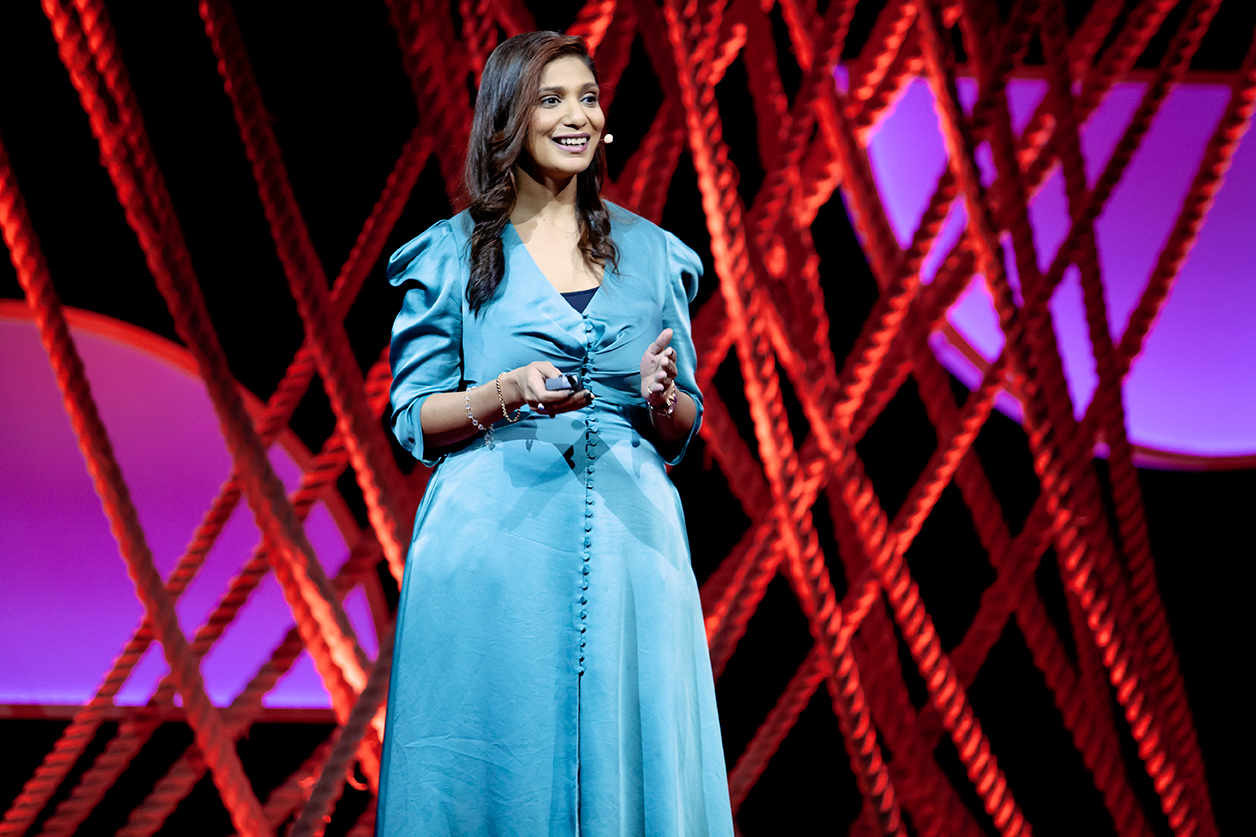
Kavita Gupta thinks a global, decentralized currency would lead us to “true financial and economic inclusivity, where every citizen in this world has the same choice, same dignity and same opportunity.” She speaks at TED@BCG at the Grand Hyatt Mumbai on September 24, 2019 in Mumbai, India. (Photo: Amit Madheshiya / TED)
Kavita Gupta, currency globalist
Big idea: The world should share one stable, decentralized currency.
How, and why? Blockchain and cryptocurrencies could provide better data privacy than anything we use today. They would be immune to global disruptions incited by local unrest or inefficient politicians while offering a global marketplace that “would not just be a way for the elite to diversify their portfolio, but also for the average person to increase sustainable wealth,” Gupta says. With real-world examples that root her perspective in the possible and achievable, she weaves a framework for a united future.
Quote of the talk: “All of this inches us toward a more stable, secure place — to true financial and economic inclusivity, where every citizen in this world has the same choice, same dignity and same opportunity.”
Markus Mutz, supply chain hacker
Big idea: We need clarity on how consumer products are made and where they come from in order to make ethical and informed decisions before purchase.
How? Over the past two years, Mutz and his team founded OpenSC (SC = supply chain) and partnered with the World Wide Fund for Nature to bring transparency and traceability to the supply chain process. Together, Mutz believes their efforts will help revolutionize the way we buy and create products. It’ll happen with three straightforward steps: by verifying production claims, tracing products throughout their supply chains and sharing information that will allow consumers to make decisions more aligned with their values — all with the aid of blockchain.
Quote of the talk: “If we have reliable and trustworthy information, and the right systems that make use of it, consumers will support those who are doing the right thing by producing products in a sustainable and ethical way.”
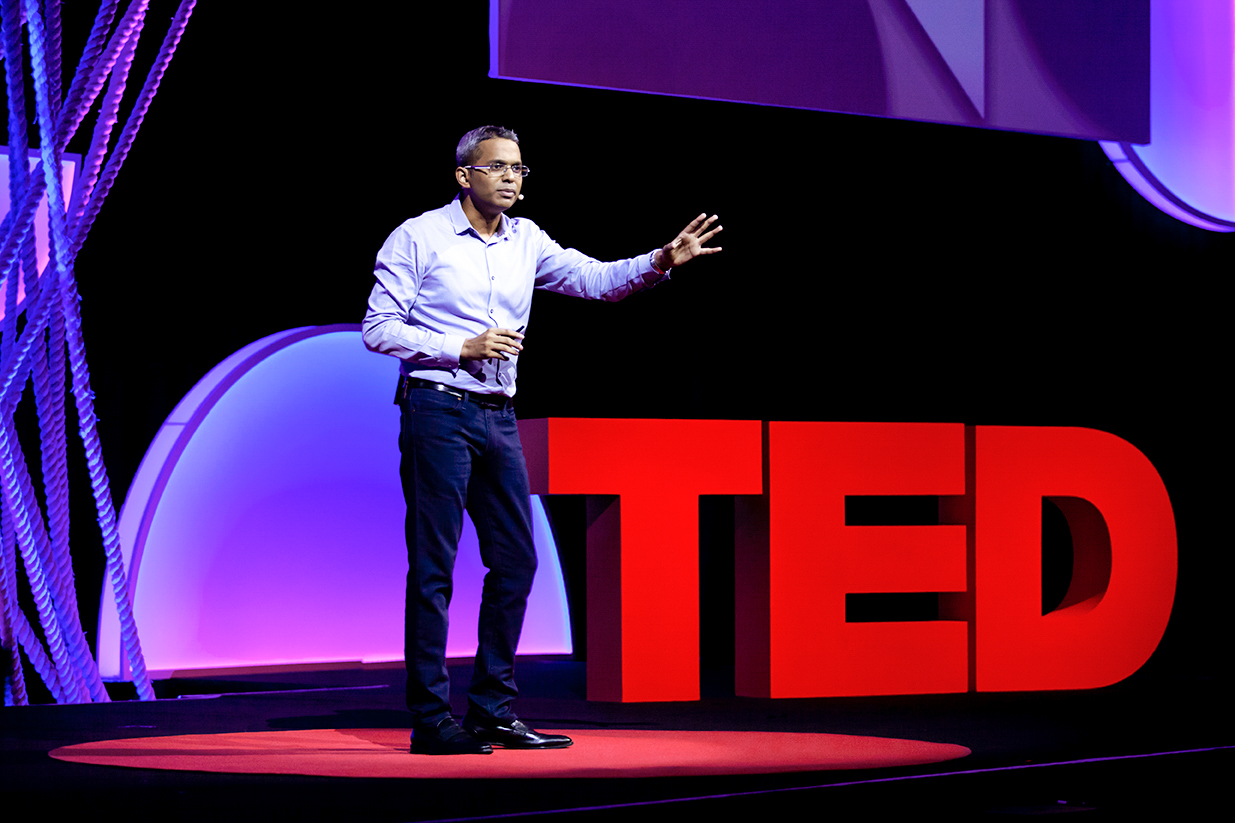
“I firmly believe that if there is any public system in any country that is in inertia, then you have to bring back the motivation. And a great way to trigger motivation is to increase transparency to the citizen,” says public sector strategist Abhishek Gopalka. He speaks at TED@BCG at the Grand Hyatt Mumbai on September 24, 2019 in Mumbai, India. (Photo: Amit Madheshiya / TED)
Abhishek Gopalka, public sector strategist
Big Idea: How do we motivate people working in public sectors like healthcare to feel accountable for providing quality care? With transparency.
Why? Internal, data-driven reviews aren’t enough to keep people accountable, says Gopalka. Instead, we need to move people to do better by sparking their competitive sides — making actions transparent so they either shine or fail in the public eye. In Rajasthan, a state in India that’s home to more than 80 million people, Gopalka has helped to significantly improve the public health system in just two years. How? Public health centers now publicly promise to provide citizens with free care, medicine and diagnosis, resulting in an increase in doctor availability, readily available drugs and, ultimately, patient visits. If applied elsewhere, transparency could benefit many broken systems. Because the first step to solving any complex issue is motivation.
Quote of the talk: “Motivation is a tricky thing. If you’ve led a team, raised a child or tried to change a personal habit, you know that motivation doesn’t just appear. Something needs to change to make you care. And if there’s one thing that all of us humans care about, it’s an inherent desire to shine in front of society.”
Gaby Barrios, marketing expert
Big Idea: By focusing less on gender when marketing products to consumers, we can build better brands — and a better world.
How? Companies often advertise to consumers by appealing to gender stereotypes, but this kind of shortcut isn’t just bad for society — it’s bad for business, says Barrios. Research shows that gender doesn’t drive choice nearly as much as companies assume, yet many still rely on outdated, condescending stereotypes to reach consumers. By looking at variables outside of gender, like location and financial status, companies can develop more nuanced campaigns, grow their brands and reach the customers they want.
Quote of the talk: “Growth is not going to come from using an outdated lens like gender. Let’s stop doing what’s easy and go for what’s right. At this point, it’s not just for your business — it’s for society.”
Sylvain Duranton, AI bureaucracy buster
Big idea: Artificial intelligence can streamline businesses, but it can also miss human nuances in disastrous ways. To avoid this, we need to use AI systems alongside humans, not instead of them.
How? For companies, deploying AI alongside human teams can be harder and more expensive than relying on AI alone. But this dynamic is necessary to ensure that business decisions take human needs and ethics into account, says Duranton. AI bases decisions on data sets and strict rules, but it can’t quite tell the difference between “right” and “wrong” — which means that AI mistakes can be severe, even fatal. By pairing AI with human teams, we can use AI’s efficiency and human knowledge to create business strategies that are successful, smart and ethical.
Quote of the talk: “Winning organizations will invest in human knowledge, not just AI and data.”
Akiko Busch, author
Big idea: In a world where transparency and self-promotion are glorified, let’s not forget the power and beauty of invisibility.
Why? Invisible cloaks, invisible ink, invisible friends — from the time we’re kids, invisibility gives us a sense of protection, knowledge and security. Akiko Busch thinks it’s time for us to reconsider the power of invisibility. When we disappear into nature, listen without responding, lose ourselves in the primal collectivity of concerts — in all cases, we become more creative and feel more connected to each other and ourselves. In an age where “visibility rules the day,” she says, there is beauty in stepping out of the spotlight, disappearing and existing — if only briefly — invisibly.
Quote of the talk: “Being unseen takes us from self-interest to a larger sense of inclusion in the human family.”
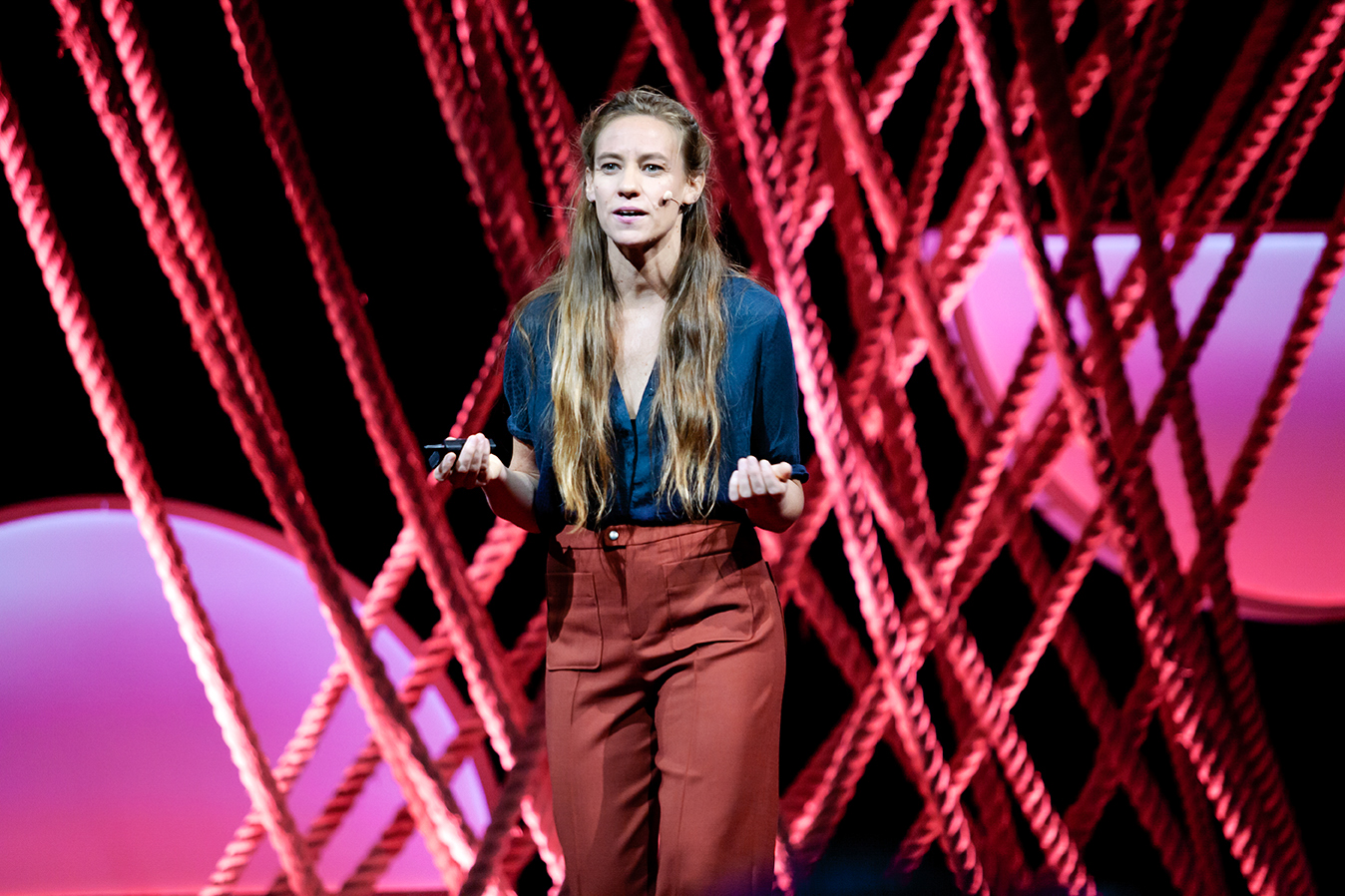
Evolutionary biologist Toby Kiers shares what fungi networks and relationships reveal about human economies — and what they can tell us about how extreme inequalities grow. She speaks at TED@BCG at the Grand Hyatt Mumbai on September 24, 2019 in Mumbai, India. (Photo: Amit Madheshiya / TED)
Toby Kiers, evolutionary biologist
Big idea: By studying fungi networks and relationships, we can learn more about how human economies work and how extreme inequalities grow.
How? Extreme inequality is one of humanity’s greatest challenges — but it’s not a uniquely human phenomenon. Like us, fungi can “strategically” trade, steal and withhold resources (though they do all this without cognitive thought, of course). Whereas human systems are built with an understanding of morals, fungi networks have evolved to be ruthless and solely opportunistic. The parallels are remarkable: for example, Kiers found that supply-and-demand economics still held true in fungi relationships. Examining these relationships gives us the chance to better diagnose problems within our own systems and even borrow solutions from the fungi. Kiers’s team is now studying the parallels between fungal network flow patterns and computer algorithms — and there’s even more ahead.
Quote of the talk: “The [fungal] trade system provides us with a benchmark to study what an economy looks like when it’s been shaped by natural selection for hundreds of millions of years, in the absence of morality, when strategies are just based on the gathering and processing of information.”
Chris Kutarna, writer and philosopher
Big idea: Facebook, Twitter and their disruptive cousins have upended our notions of truth. Social media’s assault on simple veracity has led many to cry for its regulation — but philosopher Chris Kutarna believes that we should “let social media run wild, because the truths it breaks … need to be broken.”
How? Kutarna argues that it was the age of mass media that birthed the notion that truth exists in concise, marketable chunks — and this idea does not mirror reality. Promoting a concept like “globalization” as an unassailable axiom rather than as a complex idea with many conflicting currents is reductive and dangerous. If we were to embrace social media’s multiplicity of voices and perspectives rather than enforce a single standard for truth, we could initiate a search for truths too complex for a single perspective to contain.
Quote of the talk: “What is truth? I don’t know. I can’t know because truth is supposed to be the reality that is bigger than ourselves. To find truth, we need to get together and go and search for it together. Without that search … we’re trapped in our own perspective.”
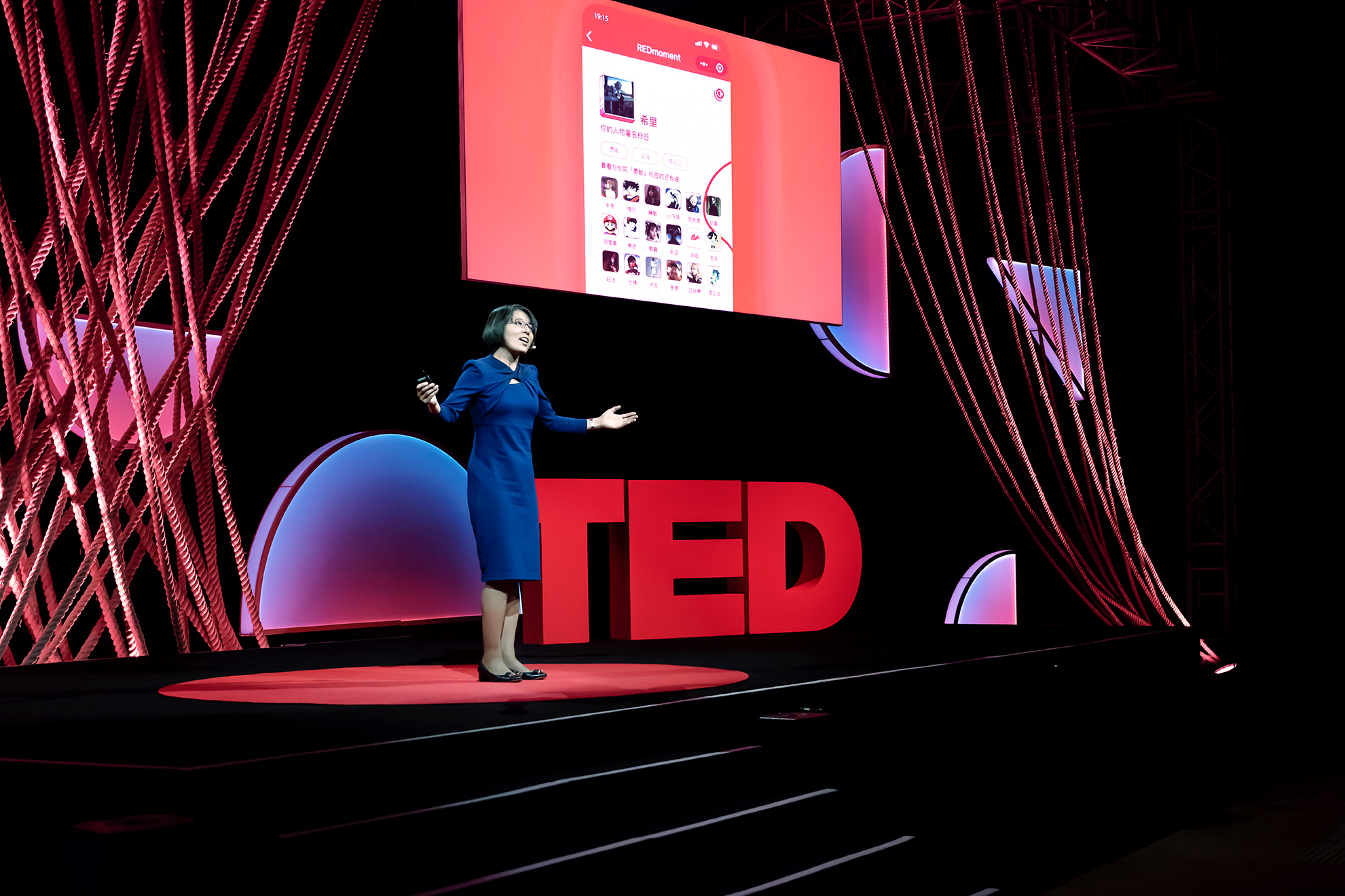
“Leaders should not impose their will; leaders should act by shaping the context rather than control,” says management consultant Fang Ruan. She speaks at TED@BCG at the Grand Hyatt Mumbai on September 24, 2019 in Mumbai, India. (Photo: Amit Madheshiya / TED)
Fang Ruan, management consultant
Big idea: Influenced by ancient Chinese philosophy, Chinese businesses are shifting towards management techniques that foster more collaborative, spontaneous environments.
How? Enjoying a delicious plate of dumplings one night, Fang Ruan was intrigued as she watched how the business was run. To her surprise, she found a “two hat” strategy: front-line managers were given new responsibilities beyond their current scope, and ideas were welcomed from people at all steps of the career ladder. This approach varies from China’s dominant, Confucianism-influenced business strategy, which values authority and seniority and has served as a time-tested formula for precise execution at a large scale. Now, as tech companies disrupt traditional industries and millennials make up a larger share of the workforce, new ways of management have emerged, Ruan says. Unconventional management is on the rise — characterized by more collaborative, innovative strategies that resemble the philosophy of Taoism, which believes things work to perfection when their natural state is supported rather than controlled.
Quote of the talk: “Leaders should not impose their will; leaders should act by shaping the context rather than control.”
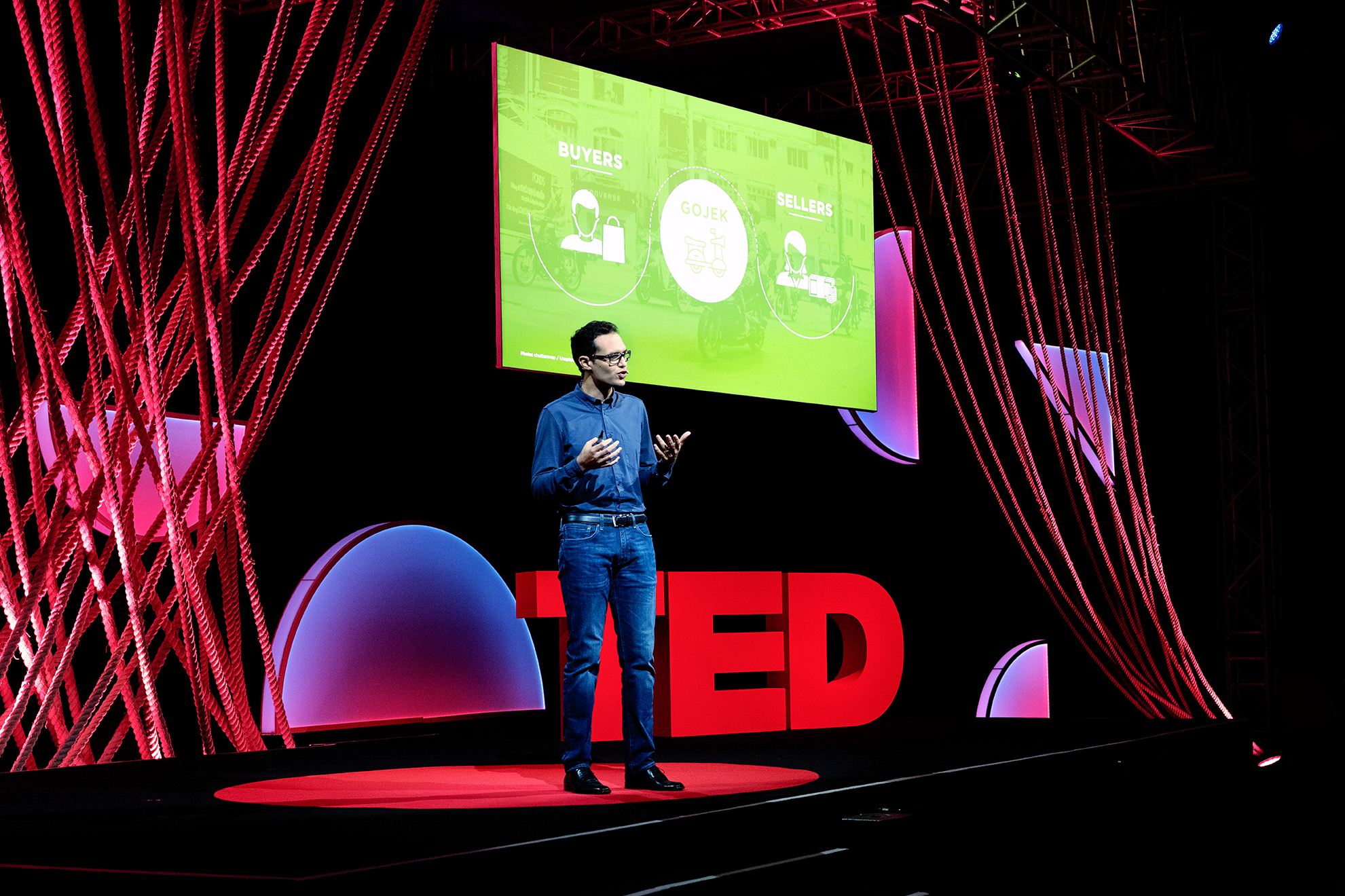
Amane Dannouni shares what digital marketplaces in the developing world can teach us about how to preserve jobs and local economies. He speaks at TED@BCG at the Grand Hyatt Mumbai on September 24, 2019 in Mumbai, India. (Photo: Amit Madheshiya / TED)
Amane Dannouni, digital business strategist
Big idea: Disruptive startups like Uber, Amazon and Airbnb have reinvented entire industries. Their digital disruption of existing services has provided game-changing benefits for their users and affiliates — but it’s also led to big losses for those whose livelihoods depended on the old, physical business models. Amane Dannouni believes that digital marketplaces in the developing world can teach us valuable lessons about how to preserve jobs and local economies.
How? Companies like Gojek in Indonesia, Jumia in Nigeria and Grab in Singapore have reinvigorated the economic landscapes that spawned them, and in the process energized their surrounding communities. They did this not by ignoring their competitors but by integrating community businesses into their own platforms, and by giving their users support — like insurance and online education — that go above and beyond simply linking providers to their patrons.
Quote of the talk: “What all these [online marketplaces] have in common is that they transition this basic functionality of matching sellers and buyers from the physical world to the digital world and, by doing so, they can find better matches, do it faster, and ultimately unlock more value for everyone.”
Lorna Davis, business leader
Big idea: We need to break our obsession with heroes. Real change can only happen when we work together.
How? “In a world as complex and interconnected as the one we live in, the idea that one person has the answer is ludicrous,” says Davis. What we really need is “radical interdependence,” shaped by leaders who set different goals and ask others to help them solve big problems. Here’s the difference: whereas “hero” leaders see everyone else as a competitor or a follower, interdependent leaders understand that they need others and genuinely want input. Likewise, heroes set goals that can be delivered through individual results, while interdependent leaders set goals that one person or organization cannot possibly achieve alone. At TED@BCG, Davis sets an “interdependent” goal of her own — calling on the world to help her in her work to end rhino poaching.
Quote of the talk: “We don’t need heroes. We need radical interdependence — which is just another way of saying: we need each other.”